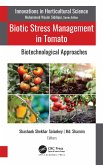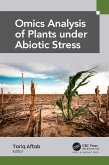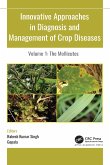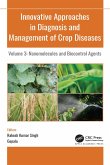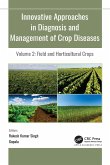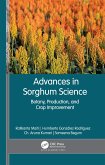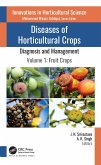Biotic Stress Management in Tomato
Biotechnological Approaches
Herausgeber: Solankey, Shashank Shekhar; Shamim, Md
Biotic Stress Management in Tomato
Biotechnological Approaches
Herausgeber: Solankey, Shashank Shekhar; Shamim, Md
- Broschiertes Buch
- Merkliste
- Auf die Merkliste
- Bewerten Bewerten
- Teilen
- Produkt teilen
- Produkterinnerung
- Produkterinnerung
This book highlights biotechnological tools and their utilization for biotic stress management in the tomato plant, one of the world's most important vegetable crops consumed by us in our daily diet and which is vulnerable to over 200 diseases as well as the impact of global climate change.
Andere Kunden interessierten sich auch für
![Biotic Stress Management in Tomato Biotic Stress Management in Tomato]() Biotic Stress Management in Tomato204,99 €
Biotic Stress Management in Tomato204,99 €![Omics Analysis of Plants Under Abiotic Stress Omics Analysis of Plants Under Abiotic Stress]() Omics Analysis of Plants Under Abiotic Stress182,99 €
Omics Analysis of Plants Under Abiotic Stress182,99 €![Innovative Approaches in Diagnosis and Management of Crop Diseases Innovative Approaches in Diagnosis and Management of Crop Diseases]() Innovative Approaches in Diagnosis and Management of Crop Diseases191,99 €
Innovative Approaches in Diagnosis and Management of Crop Diseases191,99 €![Innovative Approaches in Diagnosis and Management of Crop Diseases Innovative Approaches in Diagnosis and Management of Crop Diseases]() Innovative Approaches in Diagnosis and Management of Crop Diseases193,99 €
Innovative Approaches in Diagnosis and Management of Crop Diseases193,99 €![Innovative Approaches in Diagnosis and Management of Crop Diseases Innovative Approaches in Diagnosis and Management of Crop Diseases]() Innovative Approaches in Diagnosis and Management of Crop Diseases194,99 €
Innovative Approaches in Diagnosis and Management of Crop Diseases194,99 €![Advances in Sorghum Science Advances in Sorghum Science]() Advances in Sorghum Science167,99 €
Advances in Sorghum Science167,99 €![Diseases of Horticultural Crops Diseases of Horticultural Crops]() Diseases of Horticultural Crops204,99 €
Diseases of Horticultural Crops204,99 €-
-
-
This book highlights biotechnological tools and their utilization for biotic stress management in the tomato plant, one of the world's most important vegetable crops consumed by us in our daily diet and which is vulnerable to over 200 diseases as well as the impact of global climate change.
Hinweis: Dieser Artikel kann nur an eine deutsche Lieferadresse ausgeliefert werden.
Hinweis: Dieser Artikel kann nur an eine deutsche Lieferadresse ausgeliefert werden.
Produktdetails
- Produktdetails
- Verlag: Apple Academic Press
- Seitenzahl: 298
- Erscheinungstermin: 8. Juli 2024
- Englisch
- Abmessung: 229mm x 152mm x 17mm
- Gewicht: 431g
- ISBN-13: 9781774639566
- ISBN-10: 1774639564
- Artikelnr.: 70726530
- Herstellerkennzeichnung
- Libri GmbH
- Europaallee 1
- 36244 Bad Hersfeld
- gpsr@libri.de
- Verlag: Apple Academic Press
- Seitenzahl: 298
- Erscheinungstermin: 8. Juli 2024
- Englisch
- Abmessung: 229mm x 152mm x 17mm
- Gewicht: 431g
- ISBN-13: 9781774639566
- ISBN-10: 1774639564
- Artikelnr.: 70726530
- Herstellerkennzeichnung
- Libri GmbH
- Europaallee 1
- 36244 Bad Hersfeld
- gpsr@libri.de
Shashank Shekhar Solankey, PhD, is an Assistant Professor-cum-Jr. Scientist (Horticulture: Vegetable Science) at Dr. Kalam Agricultural College, Kishanganj under Bihar Agricultural University (BAU), Sabour (Bhagalpur), India. He has more than seven years of experience in teaching and research. He has previously worked as a Research Associate at ICAR-IIVR, Varanasi, India. His prime targeted area of research is biotic and abiotic stress resistance as well as quality improvement in vegetables, particularly, solanaceous crops and okra. Dr. Solankey has supervised several MSc students and has handled several research projects. Among his many national and international awards are a Best Teacher Award (2016) and Best Researcher Award (2016) by BAU. He has published over 50 research papers as well as review papers, a souvenir paper, books, an abstract book, over 35 book chapters, popular articles, etc. He is a life-time member of several societies and is an editorial board member and reviewer for many reputed journals. Dr. Solankey acquired a master's degree in Vegetable Science from Acharya Narendra Deva University of Agriculture and Technology, Kumarganj, Ayodhya, India, and a doctorate in Horticulture from Banaras Hindu University, Varanasi, India. Md. Shamim, PhD, is an Assistant Professor-cum-Scientist in the Department of Molecular Biology and Genetic Engineering at Dr. Kalam Agricultural College, Kishanganj (Bihar Agricultural University), India. He is the author or coauthor of over 30 peer-reviewed journal articles, over fifteen book chapters, and two conference papers. He has several authored and edited books to his credit along with several practical books. He is an editorial board member of several national and international journals. Recently, Dr. Shamim received the Young Faculty Award 2016 from the Venus International Foundation, Chennai, India. Before joining Bihar Agricultural University, Sabour. Dr. Shamim worked at the Indian Agricultural Research Institute, New Delhi, where he was engaged in heat-responsive gene regulation in wheat. Dr. Shamim also has working experience at the Indian Institute of Pulses Research, Kanpur, India, on molecular and phylogeny analysis of several Fusarium fungus and has also done research at the Biochemistry Department of Dr. Ram Manohar Lohia Institute on plant protease inhibitor isolation and their characterization. He is a member of the soil microbiology core research group at Bihar Agricultural University (BAU), where he helps with providing appropriate direction and assisting with prioritizing the research work on PGPRs. He has proved himself as an active scientist in the area of biotic stress management in rice and other crops, especially in yellow stem borer management by isolating protease inhibitor from jackfruit seeds and sheath blight resistance mechanism in wild rice, cultivated rice, and other hosts. Dr. Shamim acquired his master's (Biotechnology) and PhD (Agricultural Biotechnology) degrees from Narendra Deva University of Agriculture and Technology, Kumarganj, Faizabad, India, with specialization in biotic stress management in rice through molecular and proteomics tools.
1. Tomato Diseases, Their Impact, and Management 2. Molecular Tools for
Bacterial Wilt Resistance in Tomato 3. Molecular Methods for the
Controlling of Damping Off Seedlings in Tomato 4. Molecular Methods for the
Controlling of Late Blight in Tomato 5. Molecular Approaches of Early
Blight Resistance Breeding 6. Molecular Approaches for the Control of
Septoria Leaf Spot in Tomato 7. Molecular Approaches for the Control of
Cercospora Leaf Spot in Tomato 8. Molecular Approaches for the Control
Tomato Leaf Curl Virus (TLCV) 9. Molecular Advances of the Tobacco Mosaic
Virus Infecting Tomato 10. Molecular Approaches to Control the Root-Knot
Nematode in Tomato 11. Molecular Approaches for the Control of Fruit Borer
in Tomato 12. Molecular Approaches for Control of Sucking Pest in Tomato
13. Molecular Approaches for Multiple Genes Stacking/Pyramiding in Tomato
for Major Biotic Stress Management 14. Molecular Approaches for the
Postharvest Losses in Tomato by Different Biotic Stresses
Bacterial Wilt Resistance in Tomato 3. Molecular Methods for the
Controlling of Damping Off Seedlings in Tomato 4. Molecular Methods for the
Controlling of Late Blight in Tomato 5. Molecular Approaches of Early
Blight Resistance Breeding 6. Molecular Approaches for the Control of
Septoria Leaf Spot in Tomato 7. Molecular Approaches for the Control of
Cercospora Leaf Spot in Tomato 8. Molecular Approaches for the Control
Tomato Leaf Curl Virus (TLCV) 9. Molecular Advances of the Tobacco Mosaic
Virus Infecting Tomato 10. Molecular Approaches to Control the Root-Knot
Nematode in Tomato 11. Molecular Approaches for the Control of Fruit Borer
in Tomato 12. Molecular Approaches for Control of Sucking Pest in Tomato
13. Molecular Approaches for Multiple Genes Stacking/Pyramiding in Tomato
for Major Biotic Stress Management 14. Molecular Approaches for the
Postharvest Losses in Tomato by Different Biotic Stresses
1. Tomato Diseases, Their Impact, and Management 2. Molecular Tools for
Bacterial Wilt Resistance in Tomato 3. Molecular Methods for the
Controlling of Damping Off Seedlings in Tomato 4. Molecular Methods for the
Controlling of Late Blight in Tomato 5. Molecular Approaches of Early
Blight Resistance Breeding 6. Molecular Approaches for the Control of
Septoria Leaf Spot in Tomato 7. Molecular Approaches for the Control of
Cercospora Leaf Spot in Tomato 8. Molecular Approaches for the Control
Tomato Leaf Curl Virus (TLCV) 9. Molecular Advances of the Tobacco Mosaic
Virus Infecting Tomato 10. Molecular Approaches to Control the Root-Knot
Nematode in Tomato 11. Molecular Approaches for the Control of Fruit Borer
in Tomato 12. Molecular Approaches for Control of Sucking Pest in Tomato
13. Molecular Approaches for Multiple Genes Stacking/Pyramiding in Tomato
for Major Biotic Stress Management 14. Molecular Approaches for the
Postharvest Losses in Tomato by Different Biotic Stresses
Bacterial Wilt Resistance in Tomato 3. Molecular Methods for the
Controlling of Damping Off Seedlings in Tomato 4. Molecular Methods for the
Controlling of Late Blight in Tomato 5. Molecular Approaches of Early
Blight Resistance Breeding 6. Molecular Approaches for the Control of
Septoria Leaf Spot in Tomato 7. Molecular Approaches for the Control of
Cercospora Leaf Spot in Tomato 8. Molecular Approaches for the Control
Tomato Leaf Curl Virus (TLCV) 9. Molecular Advances of the Tobacco Mosaic
Virus Infecting Tomato 10. Molecular Approaches to Control the Root-Knot
Nematode in Tomato 11. Molecular Approaches for the Control of Fruit Borer
in Tomato 12. Molecular Approaches for Control of Sucking Pest in Tomato
13. Molecular Approaches for Multiple Genes Stacking/Pyramiding in Tomato
for Major Biotic Stress Management 14. Molecular Approaches for the
Postharvest Losses in Tomato by Different Biotic Stresses


